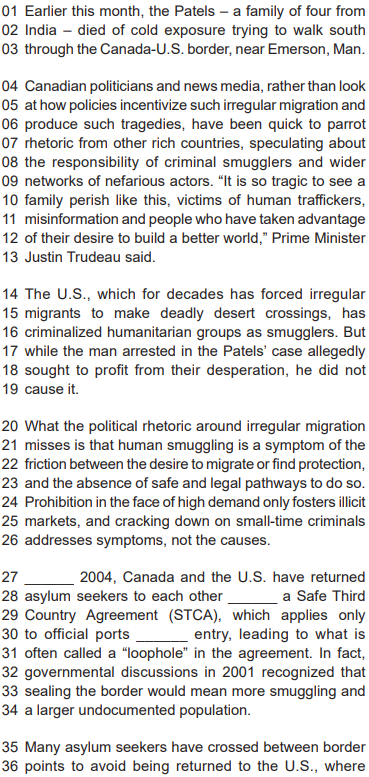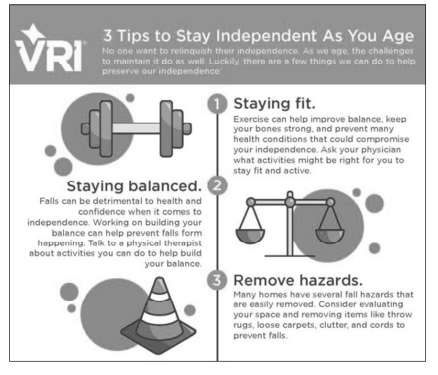Questões de Vestibular
Sobre vocabulário | vocabulary em inglês
Foram encontradas 495 questões
I- Don’t worry! Nobody understands nothing she says! II- Wait a minute, Doroty. There’s someone at the door. III- No one says “Hi, mom” anymore. IV- There isn’t anyone here to help you.
..............................I will finally be able to buy that huge house we saw during our last trip to Canada.
Ultra-processed products now make up 60% of our diet – and they’re killing us
Strange as it may seem, food has replaced tobacco as the leading cause of early death globally. Each year,more people die in America from illnesses caused by poor diet than were killed fighting in every war in US history combined. In the UK the situation is equally 1. dire. Officially, the health effects of food are entirely due to its nutritional content – the amount of fat, salt, sugar and fibre it contains. The current system leaves it up to you to read the detailed information on the pack and decide how much to eat based on recommended values, and if you have children, you’ll need to know the values for them too. This is nigh-on impossible for most people – but even if you were able to calculate exactly how much fat, salt and sugar you were consuming in each 2. mouthful, you would still be neglecting one vital determinant of health – how the food was processed. You might feel like you’ve heard all this before. People have expressed concern about “processed food” for a long time, but it’s not always been an easy concept to 3. pin down. After all, we have been processing food for hundreds of thousands of years. The human diet was invented by primarily female domestic scientists who modified plants and animals by milling, shaking, pounding and grinding them, or altering them via fermentation and heat, before salting, smoking and drying them for preservation. Food processing has shaped almost every aspect of our bodies: we have the shortest guts of any animal our size because part of their job is outsourced to our kitchens. We are the only animal that must process its food to survive. Processing is fine.
But just over a decade ago a team of scientists in Brazil noticed a 4. paradox in the data from their national nutrition surveys. Obesity had gone from being rare, to being the country’s dominant public health problem – even though people were buying less oil and sugar. What theywere eating more of was industrially processed food: biscuits, emulsified breads, confectionary and so on. The team developed a definition that distinguished between traditional food, whole or processed, and these items, which they termed ultra processed foods, or UPFs for short.
Disponible in: https://www.theguardian.com/books/2023/may/15/the-big-idea-why-we-need-a-new-definition-of-junk-food. Access in: May, 15 2023 (adapted).
Choose the alternative whose bold words have similar meanings in the sentences.
The passage “to make it free for kids to go to the movies” (third box) can be correctly rewritten as to make kids free to go to the cinema.






Read the following infographic.

Internet: <www.vricares.com> (adapted)
In section 1, it would be correct to use Exercising instead of “Exercise”, which, despite causing a slight difference in meaning, would not change the message conveyed.
The expression “Broadly speaking” (second paragraph) indicates that what follows is a general take on the subject, without considering exceptions or specificities.
Judge the follow item concerning the ideas and linguistic features of the previous text.
In the last sentence of the first paragraph, the words “others” and “yours” are both in their plural form.
TEXT 2

Available from: www.nature.com/naturemedicine. Access: 10 Oct. 2021. Adapted.
The linking word “although” (underlined in two sentences of the text) establishes a contrast
between ideas, and it may be replaced by “but”. The alternative which correctly expresses the
ideas which are contrasted in the two sentences is:
If you take a look at my smartphone, you’ll know that I like to order out. But am I helping the small local businesses? You would think that if you own a restaurant you’d be thrilled to have an outsourced service that would take care of your delivery operations while leveraging their marketing might to expand your businesses’ brand. However, restaurant owners have complained of lack of quality control once their food goes out the door. They don’t like that the delivery people are the face of their product when it gets into the customer’s hand. Some of the delivery services have been accused of listing restaurants on their apps without the owners’ permission, and oftentimes publish menu items and prices that are incorrect or out of date.
But there is another reason why restaurant owners aren’t fond of delivery services. It’s the costs, which, for some, are becoming unsustainable. Even with the increased revenues from the delivery services, the fees wind up killing a restaurant’s margins to the extent that it’s at best marginally profitable. Therefore, some restaurants are pushing harder to drive orders from their own websites and offering special deals for customers that use their in-house delivery people.
The simple fact is that these delivery apps are here to stay. They are enormously popular and have significantly grown. I believe that restaurant owners that resist these apps are hurting their brands by missing out on potential customers. The good news is that the delivery platforms are not as evil as some would portray them. They have some skin in the game. They are competing against other services. They want their listed restaurants to profit. Maybe instead of fighting, the nation’s restaurant industry needs to proactively embrace the delivery service industry and figure out ways to profitably work together.
The Guardian. 02 December, 2020. Adaptado.
How things have changed.
Now disagreements feel deadly serious. Like when your colleague pronounces that wearing a face mask in public is a threat to his liberty. Or when you see that one of your friends has just tweeted that, actually, all lives matter. Before you know it, you’re feeling angry and forming harsh new judgments about your colleagues and friends. Let’s take a collective pause and breathe: there are some ways we can all try to have more civil disagreements in this febrile age of culture wars.
1. ‘Coupling’ and ‘decoupling’
The first is to consider how inclined people are to ‘couple’ or ‘decouple’ topics involving wider political and social factors. Swedish data analyst John Nerst has used the terms to describe the contrasting ways in which people approach contentious issues. Those of us more inclined to ‘couple’ see them as inextricably related to a broader matrix of factors, whereas those more predisposed to ‘decouple’ prefer to consider an issue in isolation. To take a crude example, a decoupler might consider in isolation the question of whether a vaccine provides a degree of immunity to a virus; a coupler, by contrast, would immediately see the issue as inextricably entangled in a mesh of factors, such as pharmaceutical industry power and parental choice.
2.____________________
A study at Arizona State University, U.S., analysed more than 100,000 comments on a forum where users post their views on an issue and invite others to persuade them to change their mind. The researchers found that regardless of the kind of topic, people were more likely to change their mind when confronted with more evidence-based arguments. “Our work may suggest that while attitude change is hard-won, providing facts, statistics and citations for one’s arguments can convince people to change their minds,” they concluded.
3. Just be nicer?
Finally, it’s easier said than done, but let’s all try to be more respectful of and attentive to each other’s positions. We should do this not just for virtuous reasons, but because the more we create that kind of a climate, the more open-minded and intellectually flexible we will all be inclined to be. And then hopefully, collectively, we can start having more constructive disagreements — even in our present very difficult times.
How things have changed.
Now disagreements feel deadly serious. Like when your colleague pronounces that wearing a face mask in public is a threat to his liberty. Or when you see that one of your friends has just tweeted that, actually, all lives matter. Before you know it, you’re feeling angry and forming harsh new judgments about your colleagues and friends. Let’s take a collective pause and breathe: there are some ways we can all try to have more civil disagreements in this febrile age of culture wars.
1. ‘Coupling’ and ‘decoupling’
The first is to consider how inclined people are to ‘couple’ or ‘decouple’ topics involving wider political and social factors. Swedish data analyst John Nerst has used the terms to describe the contrasting ways in which people approach contentious issues. Those of us more inclined to ‘couple’ see them as inextricably related to a broader matrix of factors, whereas those more predisposed to ‘decouple’ prefer to consider an issue in isolation. To take a crude example, a decoupler might consider in isolation the question of whether a vaccine provides a degree of immunity to a virus; a coupler, by contrast, would immediately see the issue as inextricably entangled in a mesh of factors, such as pharmaceutical industry power and parental choice.
2.____________________
A study at Arizona State University, U.S., analysed more than 100,000 comments on a forum where users post their views on an issue and invite others to persuade them to change their mind. The researchers found that regardless of the kind of topic, people were more likely to change their mind when confronted with more evidence-based arguments. “Our work may suggest that while attitude change is hard-won, providing facts, statistics and citations for one’s arguments can convince people to change their minds,” they concluded.
3. Just be nicer?
Finally, it’s easier said than done, but let’s all try to be more respectful of and attentive to each other’s positions. We should do this not just for virtuous reasons, but because the more we create that kind of a climate, the more open-minded and intellectually flexible we will all be inclined to be. And then hopefully, collectively, we can start having more constructive disagreements — even in our present very difficult times.
Text 2
Home

No one leaves
home unless home is the mouth of a shark
you only run for the border
when you see the whole city running as well
Your neighbors running faster than you
breath bloody in their throats
the boy you went to school with
who kissed you dizzy behind the old tin factory
is holding a gun bigger than his body
you only leave homewhen
home won‘t let you stay.
No one leaves home unless home chases you
fire under feet
hot blood in your belly
it‘s not something you ever thought of doing
until the blade burnt threats into
your neck
and even then you carried the anthem under
your breath
only tearing up your passport in an airport toilet
sobbing as each mouthful of paper
made it clear that you wouldn‘t be going back.
You have to understand,
that no one puts their children in a boat
unless the water is safer than the land
no one burns their palms
under trains
beneath carriages (…)

I want to go home,
but home is the mouth of a shark
home is the barrel of the gun
and no one would leave home
unless home chased you to the shore
unless home told you to quicken your legs
leave your clothes behind
crawl through the desert
wade through the oceans (…)
No one leaves home until home is a sweaty voice in your ear
saying –
leave,
run away from me now
I dont know what I‘ve become
but I know that anywhere
is safer than here.
By Warsan Shire. Disponível em: https://www.facinghistory.org/educator-resources/current-events/many-faces-global-migration#8 Excertos.
Acesso em: set. 2020.





